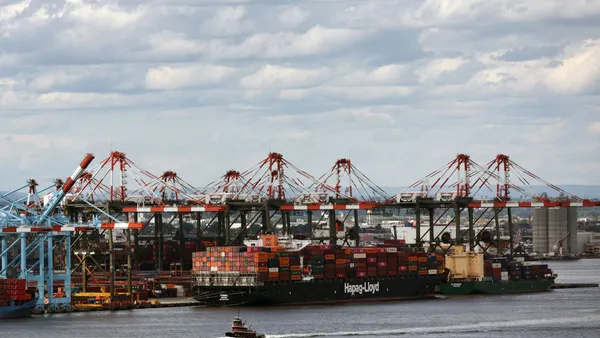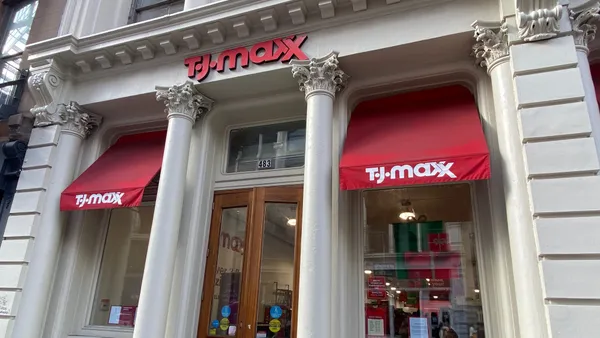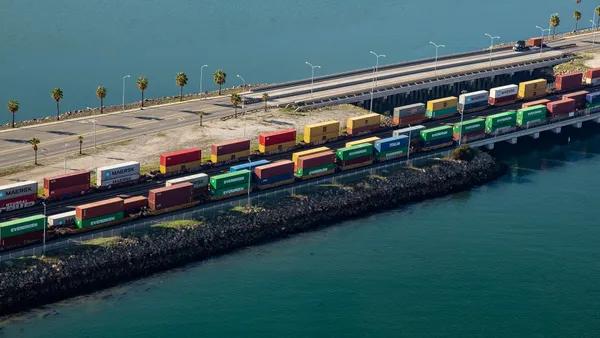Dive Brief:
- Port of Los Angeles Executive Director Gene Seroka called for a Nationwide Port Community System to allow for better data sharing between port complexes and other nodes in the supply chain, during a Wednesday press conference.
- "Today in the United States ports do not share data," Seroka said in an interview with Supply Chain Dive. Port authorities attempt to share some data between stakeholder groups, but it varies in amount and timing, he said.
- The nationwide system Seroka envisions is a tool that allows ports, carriers and shippers to get a better picture of cargo movement with details on when customers make reservations, what ship the reservation is on, when the ship is expected to arrive, the ship's historic on-time arrivals and the location of containers throughout the country.
Dive Insight:
There is no shortage of data in the world of ocean shipping. A lot of it just happens to be behind paywalled products like IHS Markit's PIERS and S&P Global's Panjiva. But these databases don't allow the user to predict what is going to happen, Seroka said.
"The timing piece is key because it's not meant to be a historical look at what happened, but rather, an early look as how you need to prepare," he said.
In Los Angeles the port's data system allows it to get data on vessels 14 days before they're expected to dock in Los Angeles thanks to a partnership with U.S. Customs. "It ties into the automated manifest system, which clears the ship 24 hours before it is to sail Asia coming to the United States," Seroka said.
The idea of the nationwide system is to give this kind of visibility to not just the Port of Los Angeles, but to railroads, truck fleets and exporters across the country.
"We are lagging as a country behind Asia, Europe, the Middle East when it comes to these Port Community Systems," he said, and the pandemic has highlighted the supply chain's need for nationwide visibility and coordination.
"We're seeing milk thrown out from our dairy farmers," he said. "We are seeing cattle slaughtered because we can't sell those meats and other agricultural products being destroyed because they're missing their shelf life due to the fact that we can't export them. So if information technology can bring people together to get a wider lens on how to move cargo, I think that's going to really assist you in opening this economy back up."
The idea for a nationwide data-sharing system has been around for a few years now. In a 2017 report, Federal Maritime Commission (FMC) Commissioner Rebecca Dye said a "National Seaport Information Portal is the key to increasing the performance of the U.S. international freight delivery system."
Dye goes on to cite the Port of Los Angeles' current information portal as an "excellent example" of how ports can benefit from better information technology. The Port Optimizer tool used in Los Angeles was launched by GE Transportation in partnership with tech startup project44.
Dye doesn't call for a government mandate to enforce the use of such a system. Instead, she recommended engagement with stakeholders "to promote the commercial development" of the portal, according to the 2017 report.
The document underscored that the FMC was happy to help coordinate discussions, but it did not want to play a role in managing the actual database. "The Commission had made clear at the outset that the Teams should focus on private commercial solutions, taking the government out of the managerial equation," the report reads.
Other issues the report raised include who would pay for such a system and the inconsistent data-collection methods across the industry.
"We don't have money to award, we cannot mandate a national standard that all must adhere to," John K. DeCrosta, the FMC's senior advisor for legislative and public affairs, told Supply Chain Dive in an interview.
Cargo fees could fund the portal, but a costly fee could leave small-scale shippers at a loss, according to the report. On data standardization, multiple companies in the ocean shipping industry have since announced plans to work together on this front.
When asked who was going to lead the creation of such a tool, Seroka said he was "proud to lead this effort." And when it comes to a mandate? "We found that voluntary participation usually works best ... So I would favor that type of an approach," he said.














